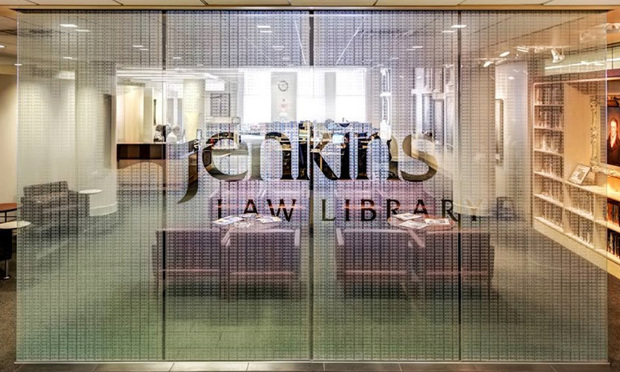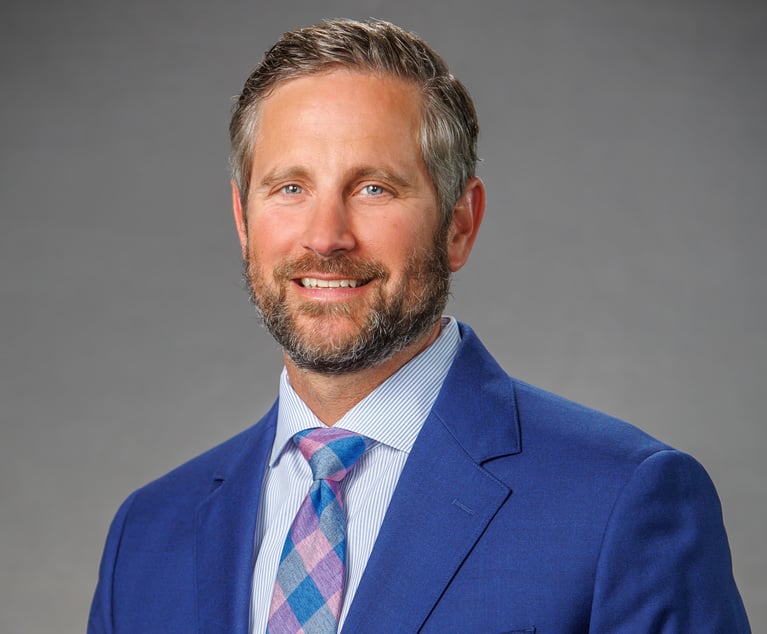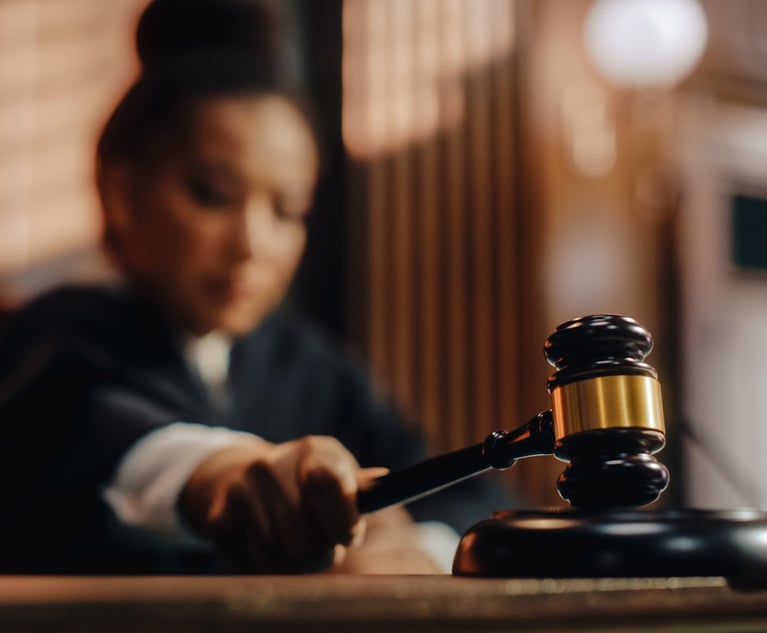Bill Aimed at Indigent Defense Funding Could Imperil Library, Advocates Say
Last year, the First Judicial District raised rates for indigent defense attorneys for the first time in nearly 20 years. Now, more than 10 months later, there is still no agreement to cover the increased costs, and the latest effort to fill the funding gap is facing a mounting pushback.
April 18, 2018 at 05:46 PM
5 minute read
 Jenkins Law Library in Philadelphia.
Jenkins Law Library in Philadelphia. Last year, the First Judicial District raised rates for indigent defense attorneys for the first time in nearly 20 years. Now, more than 10 months later, there is still no agreement to cover the increased costs, and the latest effort to fill the funding gap is facing a mounting pushback.
That pushback is powered by advocates for Jenkins Law Library who see the measure as jeopardizing the viability of the venerable Philadelphia legal institution.
Jenkins' efforts have gained support from high-profile members of Philadelphia's legal community, including eight past Philadelphia Bar Association chancellors—including Abraham Reich of Fox Rothschild and Al Dandridge of Schnader Harrison Segal & Lewis—well-known civil litigator Thomas R. Kline of Kline & Specter and prominent criminal defense attorney Michael Coard.
Late last year, state Rep. John Taylor, R-Philadelphia, introduced a bill proposing to take 67 percent of the filing fee revenue normally given to the Jenkins Law Library and re-direct that money into the FJD's general fund operating budget. Since the city, and not the court, is responsible for paying indigent defense counsel, the legislation is meant to be part of an agreement where the city would reduce the amount it would otherwise give to the FJD, so it can instead use that money to pay the court-appointed attorneys.
The former chancellors, Kline and Coard were joined by dozens of others in signing a letter written by Jenkins Law Library president Theodore “Ted” Simon opposing the bill, which is House Bill 1937. In the letter, Simon said small firms and self-represented litigants depend on the law library for access to resources like LexisNexis and Westlaw, and that cutting the funding “threatens the library's existence.”
The letter also included dozens of testimonials as to the library's utility to Philadelphia lawyers and pro se litigants.
In the meantime, there has also been some pushback from within the Philadelphia Bar Association, with the bar's solo and small firm management committee voting against a resolution seeking support for the bill, and the delivery of legal services committee deciding not to vote on the resolution. Instead, the DLS committee, which is part of the bar's Public Interest Section and includes directors of more than 30 nonprofit legal aid nonprofits, issued a position statement, saying that the proposed legislation diverts “core government responsibility and places this burden on the limited resources of a nonprofit organization, Jenkins Law Library.”
“This proposed funding scheme also creates an untenable tension between the needs of Philadelphia's nonprofit community and the needs of court-appointed counsel,” the committee's statement said.
The next board of governors meeting of the bar association is scheduled for April 26, and no decision has yet been made about whether the resolution supporting the bill will be introduced.
“Our members have expressed different opinions on this issue,” bar chancellor Mary Platt said Wednesday. “If the resolution is brought to the board, the board will hear all sides and consider the different points of view.”
In an emailed statement on Wednesday, Simon said the support was “overwhelming” and “heartwarming.”
“We level the playing field for all, whether rich or poor, self-represented litigants, solo practitioners or large firms,” he said in the statement. “We are optimistic that your Jenkins Law Library having served our community for more than 200 years will continue to proudly serve all constituents and provide equal access to justice for all.”
When the FJD approved the new fee schedule raising rates for court-appointed attorneys, the increases were estimated to add between $4.5 million and $5 million to the nearly $9 million that the city appropriates annually for counsel fees.
HB 1937 is the latest effort seeking to provide adequate funding for court-appointed counsel, but it is not the first.
In May, Taylor issued a memorandum seeking co-sponsorship of a proposed bill that would seek to impose a 10 percent fee on civil filings and allocate 33 to 50 percent of the law library fees toward supporting court-appointed attorneys. That proposal was never introduced, and sources at the time told The Legal that proposal faced pushback from the state Supreme Court.
The latest efforts come after court-appointed attorneys have struggled for years with low pay, long payment delays and, in some instances, having their fee requests slashed after providing the services.
Several attorneys who handle court-appointed cases have recently told The Legal that, despite the increases, they are still facing payment delays and frustrations continue.
Susan Lin of Kairys, Rudovsky, Messing, Feinberg & Lin, who is co-chair of the bar's criminal justice section, which has sought support for HB 1937, noted that providing adequate payment for indigent defense counsel is a constitutional obligation.
Lin, who noted she was not talking on behalf of the bar association but rather as someone who has spoken with several attorneys who do court-appointed work, said she recognized the interests of the law library and the benefits the group provides, but that the legislation is part of the difficult decision-making that has to take place to ensure that indigent defendants receive adequate counsel.
“We have to figure out what our priorities are,” she said. ”We have an obligation, for society as a whole, to provide for the defense of indigent defendants.”
Taylor did not return a call seeking comment.
This content has been archived. It is available through our partners, LexisNexis® and Bloomberg Law.
To view this content, please continue to their sites.
Not a Lexis Subscriber?
Subscribe Now
Not a Bloomberg Law Subscriber?
Subscribe Now
NOT FOR REPRINT
© 2025 ALM Global, LLC, All Rights Reserved. Request academic re-use from www.copyright.com. All other uses, submit a request to [email protected]. For more information visit Asset & Logo Licensing.
You Might Like
View All

'Discordant Dots': Why Phila. Zantac Judge Rejected Bid for His Recusal
3 minute read
Phila. Court System Pushed to Adapt as Justices Greenlight Changes to Pa.'s Civil Jury Selection Rules
5 minute read
Pa. Appeals Court: Trial Judge Dismissed Med Mal Claims Without Giving Plaintiffs Proper Time to Fight Back
4 minute readTrending Stories
- 1Bribery Case Against Former Lt. Gov. Brian Benjamin Is Dropped
- 2‘Extremely Disturbing’: AI Firms Face Class Action by ‘Taskers’ Exposed to Traumatic Content
- 3State Appeals Court Revives BraunHagey Lawsuit Alleging $4.2M Unlawful Wire to China
- 4Invoking Trump, AG Bonta Reminds Lawyers of Duties to Noncitizens in Plea Dealing
- 522-Count Indictment Is Just the Start of SCOTUSBlog Atty's Legal Problems, Experts Say
Who Got The Work
J. Brugh Lower of Gibbons has entered an appearance for industrial equipment supplier Devco Corporation in a pending trademark infringement lawsuit. The suit, accusing the defendant of selling knock-off Graco products, was filed Dec. 18 in New Jersey District Court by Rivkin Radler on behalf of Graco Inc. and Graco Minnesota. The case, assigned to U.S. District Judge Zahid N. Quraishi, is 3:24-cv-11294, Graco Inc. et al v. Devco Corporation.
Who Got The Work
Rebecca Maller-Stein and Kent A. Yalowitz of Arnold & Porter Kaye Scholer have entered their appearances for Hanaco Venture Capital and its executives, Lior Prosor and David Frankel, in a pending securities lawsuit. The action, filed on Dec. 24 in New York Southern District Court by Zell, Aron & Co. on behalf of Goldeneye Advisors, accuses the defendants of negligently and fraudulently managing the plaintiff's $1 million investment. The case, assigned to U.S. District Judge Vernon S. Broderick, is 1:24-cv-09918, Goldeneye Advisors, LLC v. Hanaco Venture Capital, Ltd. et al.
Who Got The Work
Attorneys from A&O Shearman has stepped in as defense counsel for Toronto-Dominion Bank and other defendants in a pending securities class action. The suit, filed Dec. 11 in New York Southern District Court by Bleichmar Fonti & Auld, accuses the defendants of concealing the bank's 'pervasive' deficiencies in regards to its compliance with the Bank Secrecy Act and the quality of its anti-money laundering controls. The case, assigned to U.S. District Judge Arun Subramanian, is 1:24-cv-09445, Gonzalez v. The Toronto-Dominion Bank et al.
Who Got The Work
Crown Castle International, a Pennsylvania company providing shared communications infrastructure, has turned to Luke D. Wolf of Gordon Rees Scully Mansukhani to fend off a pending breach-of-contract lawsuit. The court action, filed Nov. 25 in Michigan Eastern District Court by Hooper Hathaway PC on behalf of The Town Residences LLC, accuses Crown Castle of failing to transfer approximately $30,000 in utility payments from T-Mobile in breach of a roof-top lease and assignment agreement. The case, assigned to U.S. District Judge Susan K. Declercq, is 2:24-cv-13131, The Town Residences LLC v. T-Mobile US, Inc. et al.
Who Got The Work
Wilfred P. Coronato and Daniel M. Schwartz of McCarter & English have stepped in as defense counsel to Electrolux Home Products Inc. in a pending product liability lawsuit. The court action, filed Nov. 26 in New York Eastern District Court by Poulos Lopiccolo PC and Nagel Rice LLP on behalf of David Stern, alleges that the defendant's refrigerators’ drawers and shelving repeatedly break and fall apart within months after purchase. The case, assigned to U.S. District Judge Joan M. Azrack, is 2:24-cv-08204, Stern v. Electrolux Home Products, Inc.
Featured Firms
Law Offices of Gary Martin Hays & Associates, P.C.
(470) 294-1674
Law Offices of Mark E. Salomone
(857) 444-6468
Smith & Hassler
(713) 739-1250





